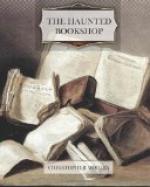“I schust want to warn you that Gissing Street is not healthy for you,” said the voice.
“Is that so?” said Aubrey sharply. “Who are you?”
“I am a friend,” buzzed the receiver. There was a harsh, bass note in the voice that made the diaphragm at Aubrey’s ear vibrate tinnily. Aubrey grew angry.
“Well, Herr Freund,” he said, “if you’re the well-wisher I met on the Bridge last night, watch your step. I’ve got your number.”
There was a pause. Then the other repeated, ponderously, “I am a friend. Gissing Street is not healthy for you.” There was a click, and he had rung off.
Aubrey was a good deal perplexed. He returned to his room, and sat in the dark by the window, smoking a pipe and thinking, with his eyes on the bookshop.
There was no longer any doubt in his mind that something sinister was afoot. He reviewed in memory the events of the past few days.
It was on Monday that a bookloving friend had first told him of the existence of the shop on Gissing Street. On Tuesday evening he had gone round to visit the place, and had stayed to supper with Mr. Mifflin. On Wednesday and Thursday he had been busy at the office, and the idea of an intensive Daintybit campaign in Brooklyn had occurred to him. On Friday he had dined with Mr. Chapman, and had run into a curious string of coincidences. He tabulated them:—
(1) The Lost ad in the Times on Friday morning.
(2) The chef in the elevator carrying the book that was supposed to be lost—he being the same man Aubrey had seen in the bookshop on Tuesday evening.
(3) Seeing the chef again on Gissing Street.
(4) The return of the book to the bookshop.
(5) Mifflin had said that the book had been stolen from him. Then why should it be either advertised or returned?
(6) The rebinding of the book.
(7) Finding the original cover of the book in Weintraub’s drug store.
(8) The affair on the Bridge.
(9) The telephone message from “a friend”—a friend with an obviously Teutonic voice.
He remembered the face of anger and fear displayed by the Octagon chef when he had spoken to him in the elevator. Until this oddly menacing telephone message, he could have explained the attack on the Bridge as merely a haphazard foot-pad enterprise; but now he was forced to conclude that it was in some way connected with his visits to the bookshop. He felt, too, that in some unknown way Weintraub’s drug store had something to do with it. Would he have been attacked if he had not taken the book cover from the drug store? He got the cover out of his bag and looked at it again. It was of plain blue cloth, with the title stamped in gold on the back, and at the bottom the lettering London: Chapman and Hall. From the width of the backstrap it was evident that the book had been a fat one. Inside the front cover the figure 60 was written in red pencil— this he took to be Roger Mifflin’s price mark. Inside the back cover he found the following notations—




